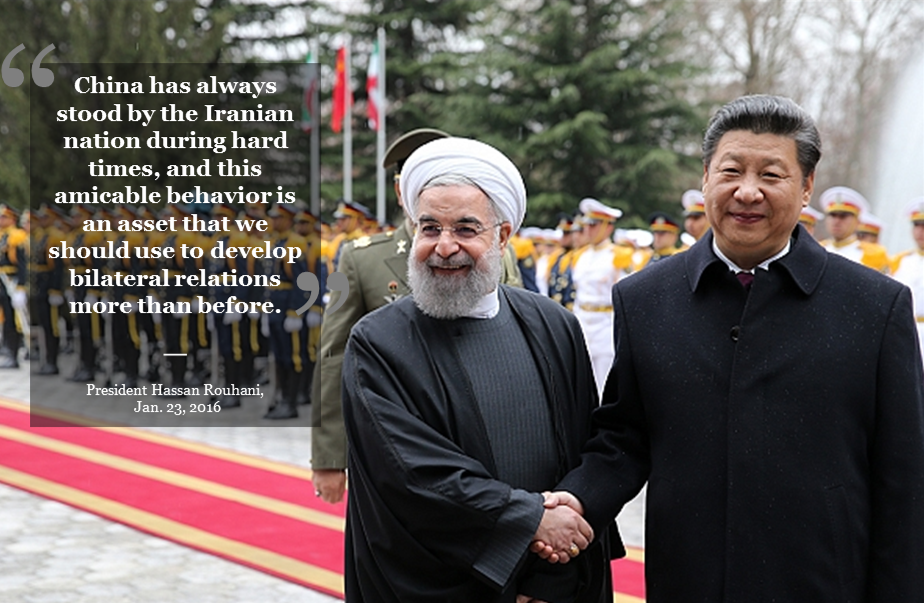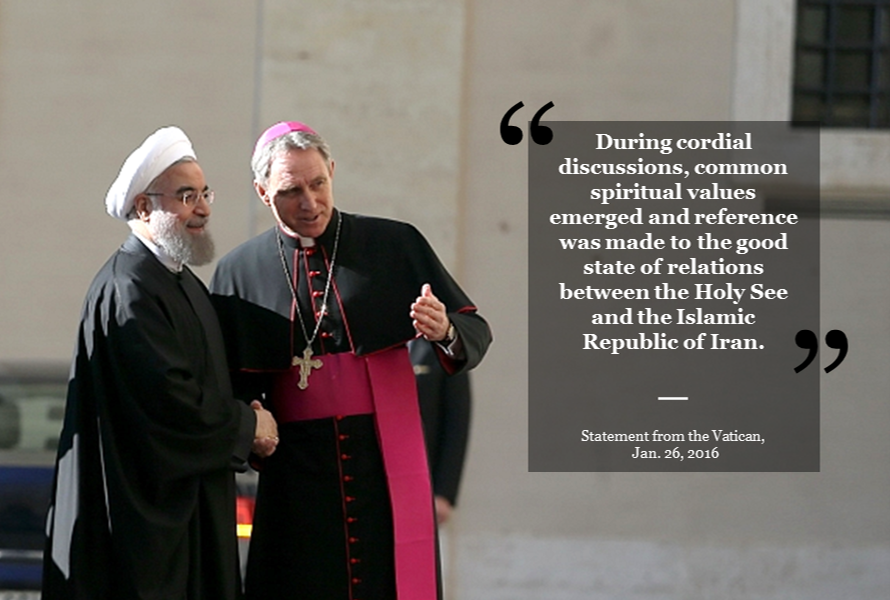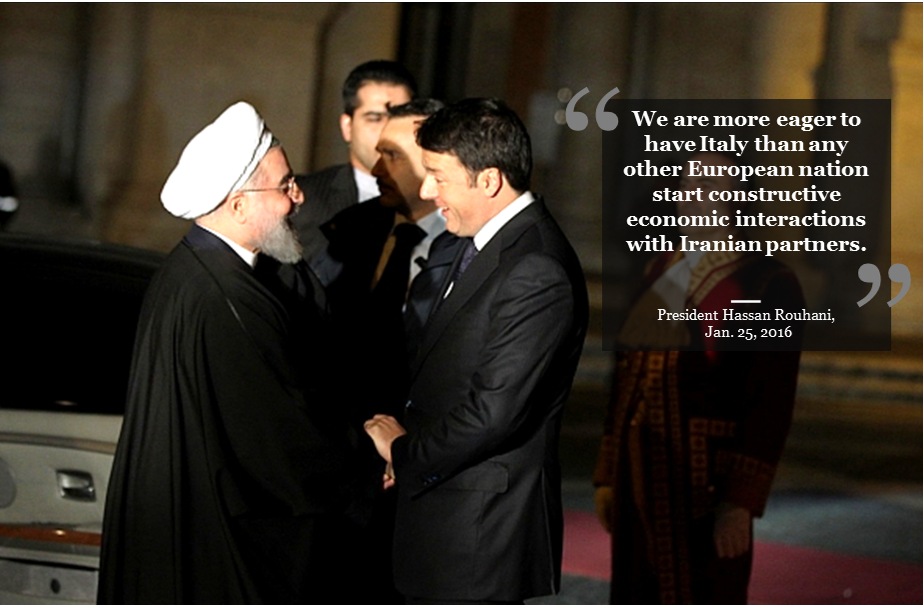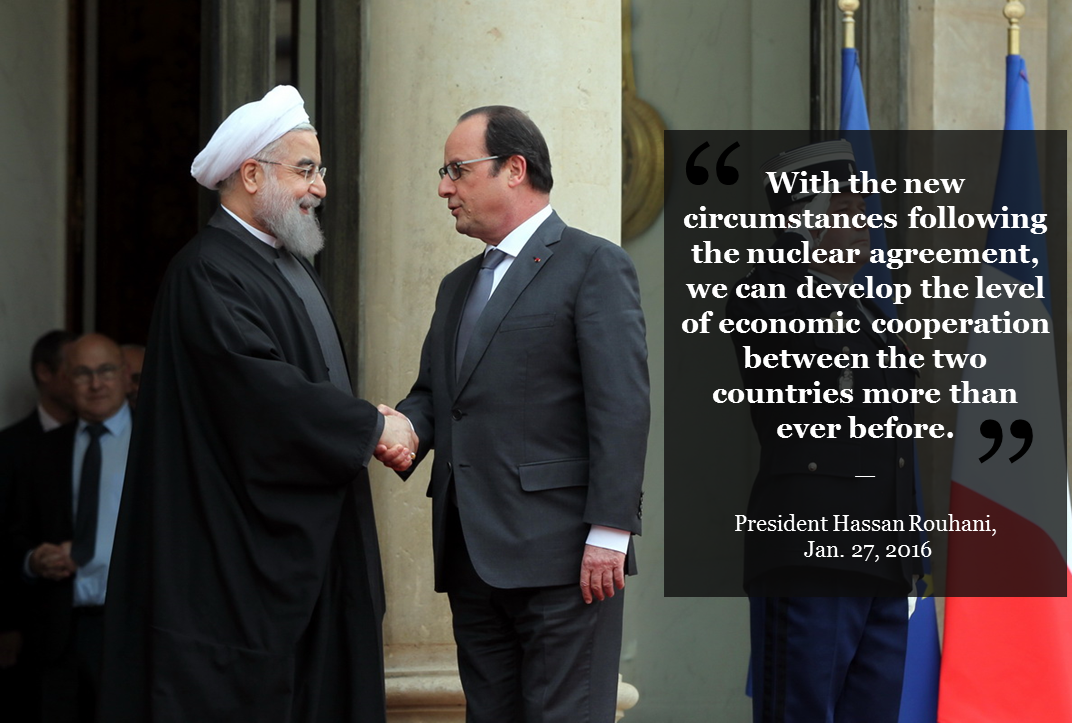Cameron Glenn
In the two weeks following implementation of the nuclear deal, Iran reached out to Europe and Asia in a series of high-profile visits. Chinese President Xi Jinping visited Iran on January 22 and 23, marking the first Chinese presidential visit to Iran in 14 years. On January 25, President Hassan Rouhani embarked on a five-day trip to Italy, the Vatican, and France. The trip - which is Rouhani's first visit to Europe - was originally scheduled for November 2015, but it was postponed due to the ISIS attacks in Paris that killed 130 people.
"Expansion of relations with E.U. members is among Tehran's main policies," Rouhani said before his trip. While in Europe, he even appeared to hint at improving ties with the United States. "It's possible that Iran and the United States might have friendly relations," he said at a press conference on January 27. "But the key to that is in Washington's hands, not Tehran's."
Both France and Italy were major trade partners with Iran before sanctions were tightened in 2010 and 2012. China is Iran’s largest trade partner and sustained economic ties even under sanctions. Officials and businessmen in all three countries are eager to establish a stronger foothold in the Iranian market. The following is a rundown of Iran’s high-profile diplomatic visits since Implementation Day.
China

Chinese President Xi Jinping visited Iran on January 22-23, following visits to Egypt and Saudi Arabia. The president, accompanied by a large business delegation, met with Supreme Leader Ayatollah Ali Khamenei and President Hassan Rouhani.
Chinese and Iranian officials signed 17 agreements in energy, industry, transportation, technology, and other fields. The two countries also released a
joint statement outlining broad goals for cooperation in politics, economics, cultural affairs, security issues, and foreign policy. The statement called for completing a 25-year comprehensive cooperation agreement between the two countries.
China continued to trade with Iran even after sanctions were tightened in 2012, but it was forced to cut back its Iranian oil imports. Iran is keen to secure Chinese investment in its ailing oil and gas industry. President Xi also considers Iran to be a crucial component to his “One Belt One Road” initiative, which aims to build transportation infrastructure across Central Asia and is framed as a renewal of the
Silk Road.
Supreme Leader Ayatollah Ali Khamenei
“The Islamic Republic of Iran will never forget China’s cooperation during the time of sanctions.”
America’s policies have “caused independent countries to pursue more cooperation with one another. The agreement between Iran and China for developing a 25-year strategic relation is within this framework. With the serious follow-up by both sides, agreements will definitely pass through the stage of implementation.”
“These hostile policies have caused the people of Iran and the officials of our country to look for developing relations with independent countries.”
– Jan. 23, 2016, in a meeting with President Xi
President Hassan Rouhani
“China has always stood by the Iranian nation during their hard time and this amicable behavior is an asset that we should use to develop bilateral relations more than before.”
“In order to develop ties between the two countries, both sides have got complete political resolve and it is necessary that this resolve strengthen in other areas, especially economy.”
“Geographically, Iran has got the capacity to become a hub for China’s economic activities in the Middle East and Central Asia and Caucasus.”
“We speculate that the amount of economic transactions between Tehran and Beijing rise to $600bn in 10 years.”
“Tehran and Beijing can boost effective cooperation for establishing security and stability of the region and we believe that there is no military solution to the issues of the region, including those of Syrian, Iraq, and Yemen and they should be settled politically.”
“Countries’ national borders should be respected and any country’s future should be left for the people of that country to decide for.”
“The Islamic Republic of Iran is still determined to continue the path of JCPOA and we are willing to foster ties and cooperation with China. We are also eager to develop peaceful nuclear cooperation by renovation of Arak reactor, as well as other sectors.”
– Jan. 23, 2016, in a meeting with President Xi
President Xi Jinping
“Tehran-Beijing ties are in a very important and strategic conditions, and today, China’s full and growing resolve to develop ties and cooperation in different sectors.”
“China is determined to develop ties between the two countries based on mutual trust and common interests, and to do this, we are trying to compose the 25-year Comprehensive Cooperation Agreement with Iran.”
“China is seeking mutual interest and win-win situation in its relations with Iran and we are ready to use the new opportunity to outline a long-term vision in bilateral regional and international ties.”
“Beijing is ready to boost ties in peaceful nuclear energy with the Islamic Republic of Iran.”
– Jan. 23, 2016, in a meeting with Khamenei and Rouhani
Italy
On January 25, Rouhani arrived in Rome and met with Italian President Sergio Mattarella and Prime Minister Matteo Renzi. Iran and Italy signed around
$18.4 billion in deals for cooperation in energy, infrastructure, shipbuilding, and mining. The two countries signed 14 MoUs, including a deal with the
Parsian Oil & Gas Development Company to upgrade the Pars Shiraz and Tabriz refineries. Iran also signed 5.7 billion euros in contracts with steel firm Danieli. During his meetings, Rouhani
invited Mattarella and Renzi to visit Iran. Rouhani also addressed a group of 500 Italian business leaders during his visit. On January 27, Iran and Italy issued a joint statement outlining a
roadmap for bilateral cooperation.
Italy was Iran’s
largest European trade partner before sanctions were tightened in 2010. Sanctions forced Italy to cut bilateral trade to one fifth of its previous volume.
President Hassan Rouhani
“The two countries could not make the best use of mutual opportunities and capacities due to the unjust and erroneous sanctions; it is about time to compensate for that and we should develop ties through interaction and in line with mutual interests.”
“For the Islamic Republic of Iran, cementing ties with Europe, especially Italy, is of high significance and in the new atmosphere the level of these ties should rise more.”
“Tehran and Rome can have fruitful consultation and cooperation in a lot of regional issues, including combatting terrorism, extremism, and violence, as before.”
– Jan. 25, 2016, in a meeting with President Mattarella
"The reason I have chosen Italy as my first destination after the Joint Comprehensive Plan of Action (JCPOA) to travel proves Iran's willing to start a new chapter in its mutual and regional relations with Italy as an old friend.”
"After JCPOA, we are more eager to have Italians before any other European nations to start a constructive interaction with their Iranian partners in the economic fields.”
– Jan. 25, 2016, in a meeting with Prime Minister Renzi
“The Islamic Republic of Iran welcomes foreign entrepreneurs and investors, especially from Italy.”
“The EU and Iran were affected by the sanctions and now, considering the new chapter in Iran’s ties and interaction with the world, it is time to compensate for the loss.”
“Today, conditions are set for investing, transferring technology, and aiming at new joint and export markets and the Islamic Republic of Iran is pursuing its economic interactions with a win-win approach.”
“Iran is not after invading any country or meddle with their internal affairs, however, it will defend its territory; on the other hand, Iran’s rules and regulations are completely trustable for investment.”
“The people of Iran have experienced Italy’s industry and services and trust on them; in addition, the type of Italy’s industry is consistent with Iran’s demands.”
– Jan. 26, 2016, in a meeting with Italian businessmen
President Sergio Mattarella
“Various industrial and trade companies are willing to cooperate with Iran and we are seeking to compensate for the opportunities that the sanctions took them away from Italy [and we are willing to do so] by investment and active presence.”
“Without a doubt, the new circumstances enables Iran to play its main and stability-creating role in the region more and better than before.”
“Italy, like Iran, believes that diplomacy is the best way to achieve sustainable peace.”
“Italy considers Iran’s role in settling the crises in the region as effective.”
“Italy welcomes Iran’s constructive role in solving issues of the countries of the region through diplomatic ways and supports it. We believe that to reach fruitful solutions, we need Iran’s effective role.”
– Jan. 25, 2016, in a meeting with President Rouhani
Prime Minister Matteo Renzi
"As a new chapter of Iran and Italy cooperation has started, Italy is not looking to start only an economic interaction with Iran, but seeks a close cooperation with it to create stability and development in the region and over the world, too.”
"Italy is committed to expanding cultural, educational and academic relations and cooperation with Iran.”
– Jan. 25, 2016, in a meeting with President Rouhani
"We should fight terrorism all together, with the presence of Iran at the negotiating table.”
“Iran plays a fundamental role in the stability of the Middle East region which is struggling with years of extremism and terrorism.”
"I am sure this visit will be a fundamental part of our ability to overcome together the challenge of fighting terrorism, atrocity and evil that we all have to confront together.”
Iran and Italy "held friendly and constructive talks geared towards enhancing bilateral cooperation and deepening consultation on the main regional and international issues.”
Foreign Minister Paolo Gentiloni
“This trip stems from deep, amicable, and ancient friendship between the two Italian and Iranian nation.”
“Today, various economic companies of Italy are eager to develop the level of their cooperation and ties with the Islamic Republic of Iran more than before.”
– Jan. 26, 2016, in a meeting with Rouhani
The Vatican

On January 26, Rouhani met with Pope Francis in Vatican City. The meeting, which occurred behind closed doors, reportedly covered religion and regional conflicts. "The parties highlighted the importance of inter-religious dialogue and the responsibility of religious communities in promoting reconciliation, tolerance and peace," the Vatican said in a
statement.
The meeting between Rouhani and the Pope was the
first of its kind since 1999.
President Hassan Rouhani
"The Islamic Republic of Iran is honoured with believing in all the divine messengers, especially Jesus Christ (PBUH), respecting all divine religions and the coexistence of Jews and Christians beside Muslims in Iran.”
"Propagating Islamophobia and doing actions to offend sanctities not only instigate and arouse negative emotions of Muslims but also helps terrorist groups as well.”
– Jan. 26, 2016, in a meeting with Pope Francis
The Vatican
Today, in the Vatican Apostolic Palace, the Holy Father Francis received in audience His Excellency Hassan Rouhani, President of the Islamic Republic of Iran, who subsequently met with His Eminence Cardinal Secretary of State Pietro Parolin, accompanied by His Excellency Archbishop Paul Richard Gallagher, secretary for Relations with States.
During the cordial discussions, common spiritual values emerged and reference was made to the good state of relations between the Holy See and the Islamic Republic of Iran, the life of the Church in the country and the action of the Holy See to favour the promotion of the dignity of the human person and religious freedom.
Attention then turned to the conclusion and application of the Nuclear Accord and the important role that Iran is called upon to fulfil, along with other countries in the Region, to promote suitable political solutions to the problems afflicting the Middle East, to counter the spread of terrorism and arms trafficking. In this respect, the Parties highlighted the importance of interreligious dialogue and the responsibility of religious communities in promoting reconciliation, tolerance and peace.
France
Rouhani arrived in France on January 27 for meetings with French Foreign Minister Laurent Fabius, President Francois Hollande, and a group of French business leaders. On January 28, French and Iranian officials signed
20 agreements for economic, political, and cultural cooperation. French automaker Peugeot announced it had reached a deal with Iran Khodro worth
$436 million to manufacture
200,000 cars per year in Iran. Energy company
Total also reportedly signed a deal to buy up to 200,000 barrels of Iranian crude oil per day. And Airbus finalized a deal to deliver more than
100 commercial jets to Iran.
Rouhani was the first Iranian president to visit to France since
1999. Despite taking a
tough stance during the nuclear negotiations, France was among the first European countries to seek improved ties with Iran after the nuclear deal was signed in July 2015. Rouhani’s visit, however, prompted
protests from French human rights groups against executions in Iran.
President Hassan Rouhani
"The Islamic Republic of Iran seeks deepening Tehran-Paris ties to the benefit of the two nations and countries and this trip is an important step in doing so.”
– Jan. 27, 2016, in statements to the press
“Today with the new circumstances following the nuclear agreement, we can develop the level of economic cooperation between the two countries more than ever before.”
“The Islamic Republic of Iran had good economic ties with France not many years ago and interactions between economic delegations of both countries in the recent months have set the ground for more economic cooperation and activities.”
“The government is determined to provide the private sector with more space.”
“Iran is also willing to have more cooperation with France in tourism industry.”
“In the process of both countries’ cooperation, it is important that we take our steps more carefully and, at the same time, quickly”.
– Jan. 27, 2016, in a meeting with French business leaders
"Tehran and Paris can do a lot to solve regional and international issues in light of their mutual ties and take great measures for the benefit of the two nations, peace and stability.”
– Jan. 28, 2016, in a meeting with the President of the French Senate
"During the course of the wrong and unjust sanctions on Iran, the two nations of Iran and France were hurt, so we should do our best to compensate loses and the lagging behind through starting a close and extensive relations.”
"As the JCPOA once again proved the powerful role of diplomacy and negotiations, so we can resolve other regional and international issues by adopting such an approaches.”
"Nowadays the region is that much more insecure and in danger by emerging criminals and terrorist groups that implies a close and all out cooperation among all to remove the threats to all human beings.”
– Jan. 28, 2016, in a meeting with the President of the French Senate
"Being in Paris reminds us the good memory of the Islamic Revolution time dated back to 1979, because Iranians in exile especially those in France did too much and played an effective role to help establishment of a religious democracy in their homeland.”
– Jan. 28, 2016, in an address to Iranian nationals in France
Foreign Minister Mohammad Javad Zarif
French Prime Minister Manuel Valls
"France has for a long time turned itself towards Iran, fascinated by its history, attracted by its culture, seduced by this great nation which is so incomparable.”
– Jan. 28, 2016, according to the press
“The session is an indication that both countries are resolved to improve relations of both public and private sectors of economy. This is a good start to extend political relations and consolidate trade in line with common economic interests.”
– Jan. 28, 2016, according to the press
French Foreign Minister Laurent Fabius
“Both countries had historical cooperation with each other and today we should start a new chapter in our cooperation and develop our ties at all levels.”
“Iran is a great country with a bright prospect and today major French companies are seriously determined to start cooperation with Iran.”
– Jan. 27, 2016, in a meeting with French business leaders
"This visit, which we hope is successful, will allow us to address the international situation and regional crises where we hope Iran can play a positive role, notably in Syria and Lebanon.”
French Senate President Gerard Larcher
“France trusts Iran’s positive role in solving regional problems and battling terrorism.”
– Jan. 27, 2016, in a meeting with Rouhani




